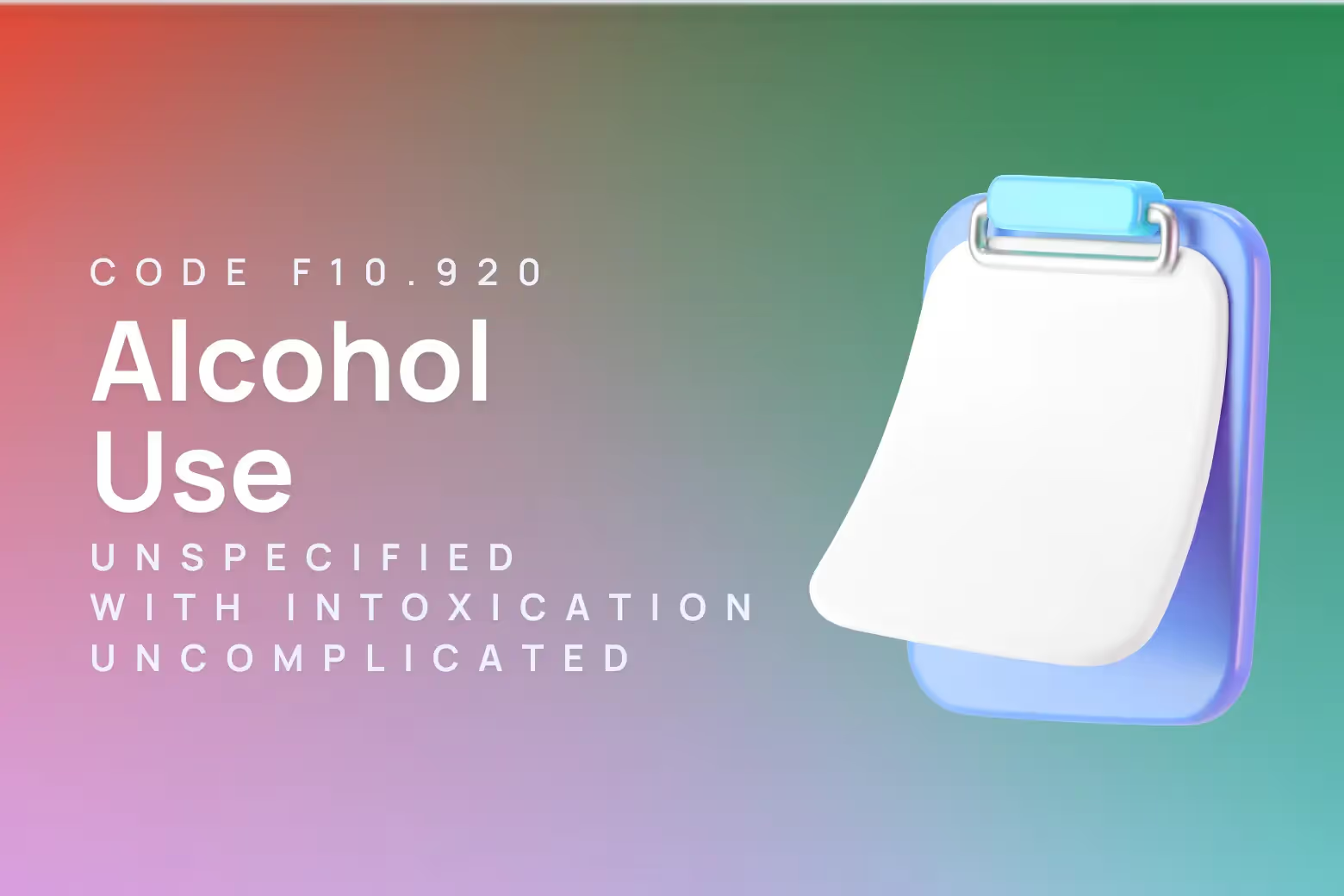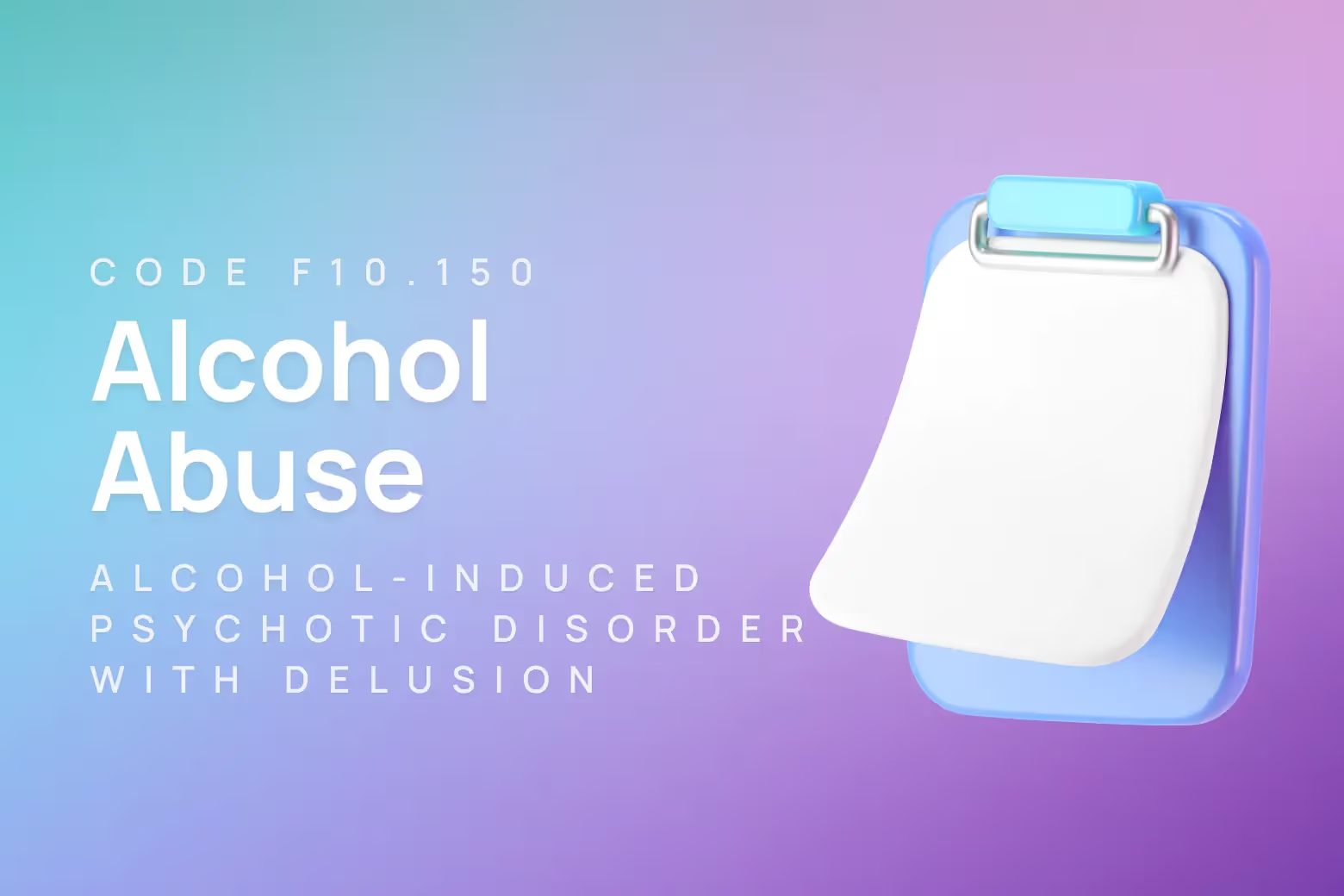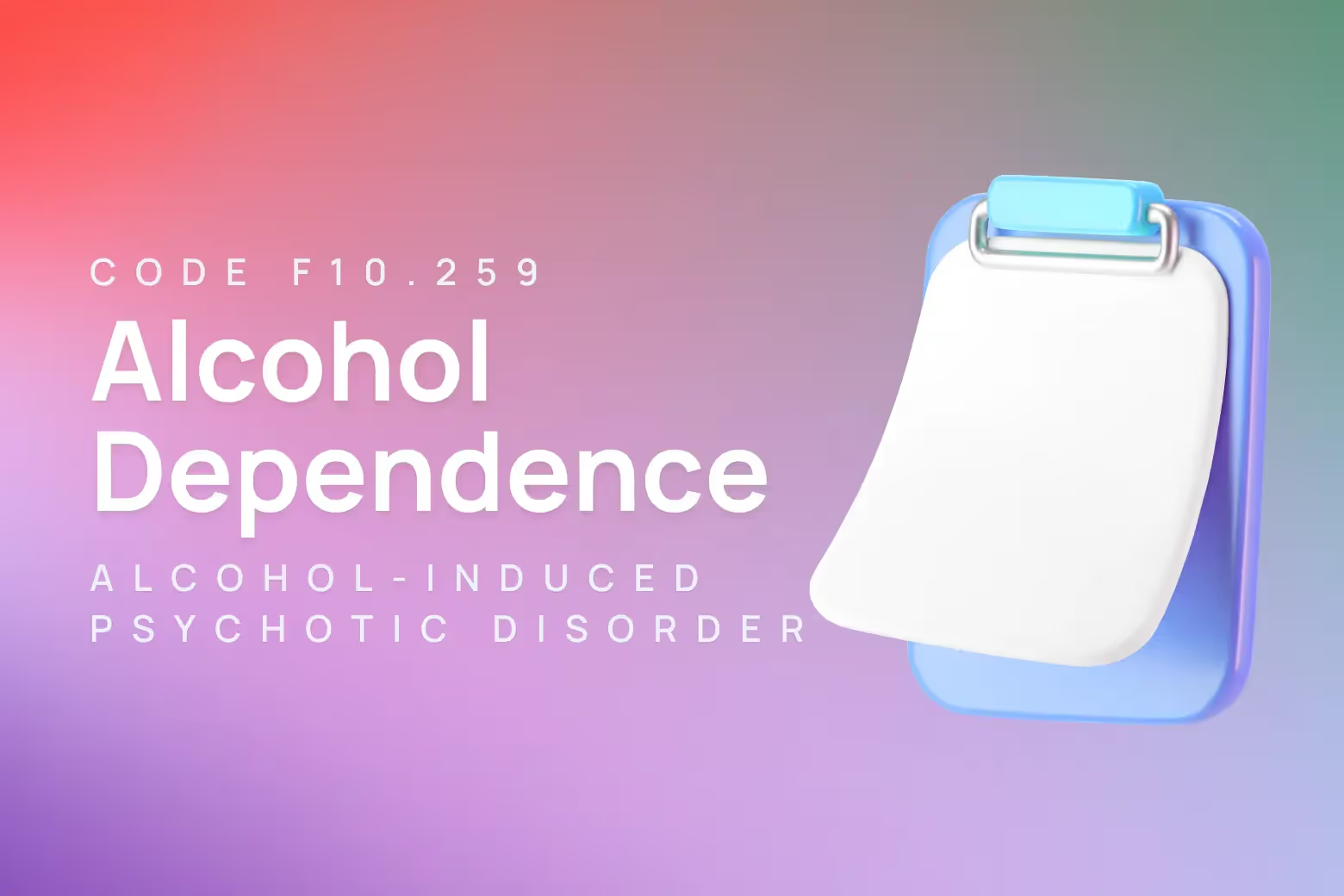ICD-10 code for alcohol use, unspecified with intoxication, uncomplicated

F10.920 is the ICD-10 code for alcohol use, unspecified with intoxication, uncomplicated.
This diagnostic code applies when a client presents with signs of alcohol intoxication but the underlying pattern of alcohol use cannot be classified as mild, moderate, or severe.
Accurate diagnosis ensures appropriate treatment planning and proper documentation for insurance reimbursement.
Key features:
- Used when alcohol intoxication is present without complications like delirium or withdrawal
- Applied when insufficient information exists to specify severity of alcohol use pattern
- Requires evidence of recent alcohol consumption causing observable behavioral or physical changes
- Does not indicate presence of alcohol use disorder unless additional criteria are met

Diagnostic criteria for alcohol intoxication (F10.920)
Alcohol intoxication represents acute impairment resulting from recent alcohol consumption. The diagnosis requires observable changes in behavior, cognition, or physical functioning that directly result from alcohol's effects on the central nervous system.
Clinical assessment focuses on identifying characteristic signs and symptoms that develop during or shortly after alcohol consumption.
Blood alcohol concentration provides objective confirmation, though clinical presentation remains the primary diagnostic indicator.
Required diagnostic criteria include:
- Recent alcohol consumption documented through history, observation, or biological testing
- Clinically significant behavioral or psychological changes developing during or after drinking
- Observable signs such as slurred speech, coordination problems, unsteady gait, or impaired attention
- Symptoms not attributable to another medical condition or mental disorder
- Absence of complications such as delirium, perceptual disturbances, or coma
When to use F10.920 diagnosis code
Proper application of F10.920 requires careful differential diagnosis from related alcohol-induced conditions. This code specifically addresses uncomplicated intoxication where the severity of underlying alcohol use patterns remains unclear.
F10.920 vs F10.129 (Alcohol use disorder, mild, with intoxication)
Use F10.120 when clear evidence exists of mild alcohol use disorder with 2-3 diagnostic criteria met within the past 12 months. The intoxication occurs within the context of established problematic drinking patterns.
Choose F10.920 when intoxication is present but insufficient information exists to establish the presence or severity of alcohol use disorder. This might occur in emergency settings or during initial assessments.
F10.920 vs F10.921 (Alcohol use, unspecified with intoxication, delirium)
F10.921 applies when alcohol intoxication includes delirium symptoms such as altered consciousness, cognitive disturbance, or perceptual abnormalities. These complications indicate more severe intoxication requiring different treatment approaches.
F10.920 specifically excludes delirium and other complications, representing straightforward intoxication without altered mental status beyond typical alcohol effects.
F10.920 vs F10.929 (Alcohol use, unspecified with intoxication, unspecified)
F10.929 serves as a broader category when documentation lacks specificity about complications. Use F10.920 when clinical assessment clearly establishes absence of complications like delirium or withdrawal symptoms.
Related ICD-10 codes
- F10.92 - Alcohol use, unspecified with intoxication
- F10.921 - Alcohol use, unspecified with intoxication, delirium
- F10.929 - Alcohol use, unspecified with intoxication, unspecified
- F10.10 - Alcohol use disorder, mild
- F10.20 - Alcohol use disorder, moderate or severe
Interventions and CPT codes for alcohol intoxication
Treatment approaches for F10.920 focus on immediate safety management and assessment of underlying alcohol use patterns. Evidence-based interventions address both acute intoxication effects and prevention of future alcohol-related problems.
Initial assessment and diagnostic evaluation
Comprehensive psychiatric diagnostic evaluation establishes baseline functioning and identifies co-occurring conditions. This assessment determines appropriate level of care and treatment recommendations moving forward.
CPT Code 90791 - Psychiatric diagnostic evaluation covers initial intake to assess alcohol use patterns, mental status examination, diagnosis establishment, and treatment planning. Use for first visits or new episodes of care.
Brief intervention and screening
Structured screening combined with brief intervention addresses alcohol use patterns identified during intoxication episodes. This approach proves effective for individuals who may not meet criteria for alcohol use disorder but demonstrate risky drinking behaviors.
CPT Code 99408 - Structured screening and brief intervention (15-30 minutes) documents standardized assessment tools, risk level determination, and brief counseling elements. Appropriate for commercial insurance when combining screening with brief intervention during the same visit.
CPT Code 99409 - Extended structured screening and brief intervention (over 30 minutes) provides additional time for comprehensive assessment and motivational interviewing techniques.
Individual psychotherapy
Ongoing individual therapy targets alcohol misuse patterns and relapse prevention strategies. Treatment approaches include motivational interviewing, cognitive-behavioral therapy, and relapse prevention training.
CPT Code 90834 - Psychotherapy (45 minutes) addresses alcohol use patterns, coping skills development, and trigger identification. Time-based coding requires 38-52 minutes of face-to-face contact.
CPT Code 90837 - Extended psychotherapy (60 minutes) allows for comprehensive cognitive-behavioral interventions and detailed relapse prevention planning. Use when session duration exceeds 53 minutes.
Family involvement
Family psychotherapy addresses relationship dynamics, codependency patterns, and family-based relapse prevention strategies. Family involvement improves treatment outcomes and provides additional support systems.
CPT Code 90847 - Family psychotherapy with patient present includes family members in treatment planning and skill development. Particularly valuable for addressing enabling behaviors and communication patterns.
How Upheal improves F10.920 ICD-10 documentation
Suggesting appropriate ICD-10 codes based on session content
Upheal's clinical documentation platform analyzes session notes and client presentations to recommend accurate diagnostic codes.
The system recognizes patterns consistent with alcohol intoxication and suggests F10.920 when evidence supports uncomplicated intoxication without specified alcohol use disorder severity.
This AI-powered assistance reduces coding errors and ensures proper classification of alcohol-related presentations. Clinicians receive real-time suggestions that align with diagnostic criteria and clinical documentation requirements.
Maintaining HIPAA-compliant records with proper diagnostic coding
The platform automatically generates compliant documentation that includes proper ICD-10 coding for alcohol-related conditions.
Each session note captures relevant diagnostic criteria and clinical observations that support F10.920 diagnosis when appropriate.
Secure data handling ensures client confidentiality while providing comprehensive documentation for insurance reimbursement and treatment planning purposes. Built-in compliance features reduce administrative burden while maintaining documentation quality.
Reducing administrative burden so you can focus on client care
Automated note generation and code suggestions allow clinicians to spend more time on direct client care rather than documentation tasks.
The system handles complex coding decisions and generates detailed session notes that support diagnostic conclusions.
Time saved on administrative tasks can be redirected toward therapeutic interventions and client engagement. This improved efficiency benefits both clinicians and clients through more focused treatment delivery.
Supporting clients with alcohol intoxication
Clients presenting with F10.920 require immediate safety assessment and careful evaluation of underlying alcohol use patterns.
Treatment planning considers both acute intoxication management and longer-term alcohol use concerns that may emerge through comprehensive assessment.
Therapeutic approach emphasizes non-judgmental support while conducting thorough risk assessment. Many clients benefit from motivational interviewing techniques that explore their relationship with alcohol without imposing predetermined treatment goals.
Collaborative treatment planning respects client autonomy while providing education about alcohol-related risks and available treatment options.
The goal involves helping clients make informed decisions about their alcohol use and connecting them with appropriate resources when indicated.
Upheal's clinical documentation platform supports these complex cases by providing accurate diagnostic coding suggestions and comprehensive session documentation.
The system helps clinicians focus on therapeutic relationships while ensuring proper documentation for F10.920 and related alcohol use presentations.
Try Upheal for free to improve your clinical documentation efficiency and diagnostic accuracy.













